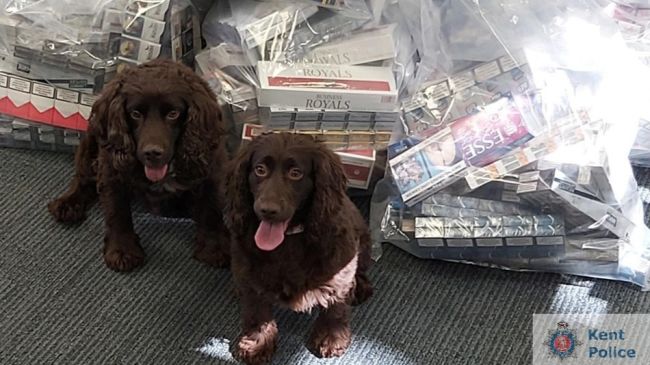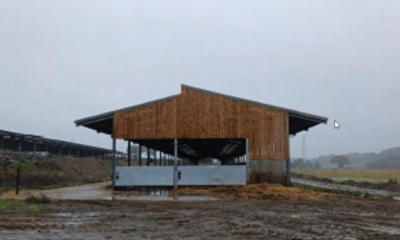News
Pembrokeshire specialist dogs help Kent Police in tobacco bust

A TWO-DAY operation which saw hundreds of thousands of illegal cigarettes and tobacco seized wouldn’t have happened without two crime-fighting dogs from Pembrokeshire, their owner has said.
Operation Puggle, which took place on April 3 and 4, saw 242,500 illicit cigarettes and 1,516 pouches of tobacco pouches – worth an estimated street value of £76,000 – seized from eight shops.
Five detection dogs from B.W.Y Canine in Llandissilio took part in the joint operation at Gravesend, involving Kent Police and Kent Trading Standards, customs and the UK Immigration Service.
Stuart Phillips, from BWY Canine, said: “I was tasked by Kent Police and Kent Trading Standards to assist them on Operation Puggle, which is an ongoing operation to disrupt the illegal tobacco trade in Gravesend and tackle organised crime. Over the two days I used five specialist detection dogs to support the operation.
“Without the dogs, there would have been no results, the dogs were the major players in this two-day operation.”
During the operation, one of Stuarts dogs, Bran, indicated there was tobacco behind some tiling in a basement. Officers removed this false panel and found that a tunnel had been dug through to the basement of the adjoining shop.
Inside the tunnel officers found more than 148,000 cigarettes and 1,315 pouches of tobacco, the largest single seizure that team had secured.
“Bran the tobacco detection dog discovered a secret tunnel containing hundreds of thousands of smuggled cigarettes and pouches of tobacco. Without Bran, it would never have been found,” Stuart said.
The following day, officers found a chute behind a counter in another shop, thanks to BWY Canine, following it up to a second floor flat above the shop.
Fellow BWY Canine dog Yoyo gave the indication there was tobacco inside so officers forced entry, finding 58,900 illicit cigarettes and 135 pouches of tobacco hidden behind magnetic concealments inside three false walls.
“On day two, Yoyo identified a room in a block of flats being used to store illegal tobacco. The cigarettes were hidden in specially constructed walls within a bedroom, which was on the second floor in a building. In the same bedroom there was a chute which was used to drop the illegal cigarettes to the shop on the ground floor.
“Cooper the tobacco dog (fox red lab) actually found the chute exit in the shop because a pack of cigarettes was stuck in the chute. Again, none of these finds would have been possible without the dogs.”
Inspector James Beautridge of North Kent’s Community Safety Unit said: ‘The results from these two days shows just how prevalent this issue is, and the lengths to which some shop owners will go in order to hide these products and avoid detection.”
During the operation illegal vapes were also seized and fines were issued for immigration offences.
Stuart and the BWY Canine dogs have been assisting Trading Standards, Police and Customs to disrupt organised crime and tackle illegal tobacco in the UK for a decade now, gaining a reputation amongst law enforcement agencies for providing tobacco and cash detection dogs that get results.
“Over the past 10 years I have worked with over 100 Trading Standards teams and 20 police services, supporting them with specialist tobacco and cash detection dogs.
“In a routine five-day week, myself and the dogs will carry out between 20 and 35 searches of shops, houses and other locations suspected of being involved in the sale and distribution of illegal tobacco.”
Detection dogs
In total, five detection dogs used over the two days.
Cooper – Tobacco dog – Fox Red Lab
Maggie – Cash Dog – Cocker with pink collar
Yoyo – Tobacco Dog – Cocker Spaniel
Bran – Tobacco Dog – Cocker Spaniel
Griff – Toobacco Dog – Liver and white Springer Spaniel
Yoyo indicated on the door to the flat above the shop New Road Groceries.
Maggie found criminal cash in black rucksack at rear of one shop on Milton Road.
Cooper found concealment in Smart Shop yesterday. Cooper also found concealment in New Road Groceries today.
Bran found the tunnel yesterday in Queen Street shop.
Griff worked hard but didn’t find anything unfortunately.
News
Prince William faces diplomatic tightrope on first Saudi Arabia visit

Energy, trade and human rights concerns collide as UK deploys monarchy’s ‘soft power’
PRINCE WILLIAM will step into one of the most politically sensitive overseas trips of his public life this week as he travels to Saudi Arabia at the request of the UK Government.
Unlike recent royal visits to Estonia, Poland or South Africa, this tour carries significant diplomatic weight, placing the Prince of Wales at the centre of a complex balancing act between strengthening economic ties and confronting a deeply controversial human rights record.
Sources close to the Palace say William “didn’t flinch” when asked to go, viewing such duties as part of his responsibility as heir to the throne.
But Saudi Arabia presents challenges unlike almost anywhere else on the royal calendar.
A country in transition
The visit will focus on energy transition and young people, two areas the kingdom is promoting heavily as it attempts to diversify its oil-dependent economy.
In recent years Saudi Arabia has staged major sporting and cultural events, including Formula One races, international film festivals and high-profile entertainment shows. The country will also host the men’s football World Cup in 2034.
Officials argue this signals modernisation and openness.
Critics say it is “sportswashing” — using global events to distract from repression.
Human rights organisations including Amnesty International continue to raise concerns over restrictions on free speech, criminalisation of same-sex relationships and harsh penalties for dissent.
While reforms have allowed women to drive and increased participation in public life, significant legal and social limits remain.
Meeting a controversial leader
Central to the trip will be talks with Mohammed bin Salman, widely known as MBS, the kingdom’s de facto ruler.
The crown prince is credited with pushing economic reforms but remains internationally divisive.
A US intelligence report concluded he approved the 2018 killing of journalist Jamal Khashoggi inside the Saudi consulate in Istanbul — an allegation he denies and Saudi Arabia rejects.
Whether William raises such issues privately is unlikely to be disclosed. Kensington Palace does not comment on confidential conversations.
However, the prince will be briefed extensively by the Foreign Office and the British Embassy before any meetings.
Soft power diplomacy
Government insiders describe William as a key diplomatic asset.
One source said the monarchy acts as a “secret weapon”, able to open doors politicians sometimes cannot.
This form of so-called soft power has long been part of the Royal Family’s overseas role — building relationships first, leaving governments to handle the harder negotiations.
Dr Neil Quilliam of Chatham House says Saudi leaders value high-level recognition from Britain.
“Deploying Prince William sends a signal that the UK takes the relationship seriously,” he said.
Energy cooperation and investment are expected to dominate talks, particularly as Britain seeks new partners during the global shift away from fossil fuels.
Echoes of the past
The visit also reflects longstanding links between the two royal families.
King Charles III has travelled to Saudi Arabia numerous times over the decades and is said to maintain warm relations with senior figures there.
William is now expected to assume a more prominent global role as he prepares for future kingship.
A delicate balancing act
For many observers, images of handshakes between William and MBS will be uncomfortable.
Yet world leaders continue to engage with Riyadh, citing its strategic and economic importance.
The prince’s task is unlikely to involve grand statements. Instead, it will be quiet diplomacy — maintaining dialogue while representing British values.
It is a careful, sometimes uneasy role.
But it is one the monarchy has long performed: building bridges in places where politics alone struggles to tread.
Community
Ice rink campaign launched for Pembrokeshire

Survey underway as resident explores sites and funding for year-round skating facility
PLANS to bring a permanent ice skating rink to Pembrokeshire are gathering momentum after a local resident began talks with council officers and launched a public survey to test demand.

Jemma Davies, from Newgale, says the county is missing out on a major leisure attraction that could benefit families, schools and visitors while creating new jobs.
At present, the nearest full-time rink for Pembrokeshire residents is in Cardiff — a round trip of several hours — making regular skating sessions difficult for many families.
She believes a local facility could change that.
“I think it would give people something completely different to do here,” she said. “It’s exercise, it’s social, and it’s something children could take up after school instead of having to travel out of the county.”
Early talks with council
Jemma has already met officers from Pembrokeshire County Council’s sport and recreation department to discuss whether the idea could be viable.
She is also hoping to approach Sport Wales to explore possible funding streams and support.
To measure interest, she has set up an online questionnaire asking residents whether they would use an ice rink and how far they would be willing to travel.
She said early responses have been positive, with families, young people and skating enthusiasts backing the idea.
Reusing empty buildings
Rather than constructing a new arena, Jemma is investigating whether vacant premises could be converted, reducing costs.
Potential options include a former retail unit in Haverfordwest or a large hangar-style building near existing leisure attractions.
She said: “If we can reuse a building that’s already there, it keeps the costs down and brings life back into empty spaces at the same time.”
As part of her research, she plans to visit Vindico Arena to better understand the practicalities of running a rink.
More than just skating
Beyond public sessions, she believes a rink could host school trips, birthday parties, events and competitions, while encouraging young people to take up winter sports.
“Pembrokeshire has produced plenty of sporting talent over the years,” she said. “There’s no reason we couldn’t develop figure skaters or ice hockey players here too.”
Residents who want to share their views can complete the online survey.
Cover image:
Jemma Davies: Hopes to bring a permanent ice rink to Pembrokeshire (Pic: Supplied).
Cymraeg
Moonpig’s Welsh fail still on sale as mistranslated St David’s Day card sparks laughs

A GREETING card meant to celebrate St David’s Day has become an accidental comedy hit after shoppers spotted its Welsh message makes absolutely no sense – and, even better, it is still on sale.
The card, sold by online retailer Moonpig, reads: “Hapus Dewi Sant Dydd.”
Unfortunately for the designers, that translates back into something closer to “Happy David Saint Day” or “Day Saint David Happy” rather than the correct Welsh phrase, “Dydd Dewi Sant Hapus.”
In other words, the words are right – just in completely the wrong order.
The mistake was first highlighted by Nation.Cymru, prompting plenty of amusement online, with some joking it looked like the result of a lazy copy-and-paste from an automatic translator.
The Herald decided to check for itself.
And yes – as of today – the card is still live and available to buy on Moonpig’s website.
Customers can personalise it and add it to their basket just like any other design, with no sign the message has been corrected.
One reader joked: “It’s like they put the words in a hat and picked them out at random.”
Another described it as “peak AI Welsh”.
For Welsh speakers, the error is immediately obvious. Welsh sentence structure differs from English, so simply translating each word individually rarely works. It’s the linguistic equivalent of writing “Birthday happy you” on a cake.
There was also online chatter that the dragon artwork may be facing the wrong direction – though by that point, the language had already stolen the show.
With St David’s Day cards meant to celebrate Welsh culture, the gaffe feels particularly ironic.
Still, if you fancy a collector’s item or a bit of office wall décor, you might want to be quick. Once someone at Moonpig finally runs it past an actual Welsh person, this one could quietly disappear.
Photo caption: The mistranslated St David’s Day card still available for sale on the Moonpig website (Pic: Moonpig).
-

 Health3 days ago
Health3 days agoHealth board targets rise in steroid and gym drug use across west Wales
-

 Crime4 days ago
Crime4 days agoSex offender jailed after living off grid in Pembrokeshire and refusing to register
-

 News5 days ago
News5 days agoPrincess of Wales visits historic Pembrokeshire woollen mill
-

 Crime3 days ago
Crime3 days agoTeacher injured and teenager arrested for attempted murder at Milford Haven School
-

 Crime5 days ago
Crime5 days agoHakin man’s appeal delayed again as Crown Court seeks guidance on insurance law
-

 Crime6 days ago
Crime6 days agoArrest made after Carmarthen park stabbing investigation
-

 international news7 days ago
international news7 days agoMandelson quits Labour over Epstein controversy
-

 Crime6 days ago
Crime6 days agoMan guilty of threatening to kill Herald editor






































